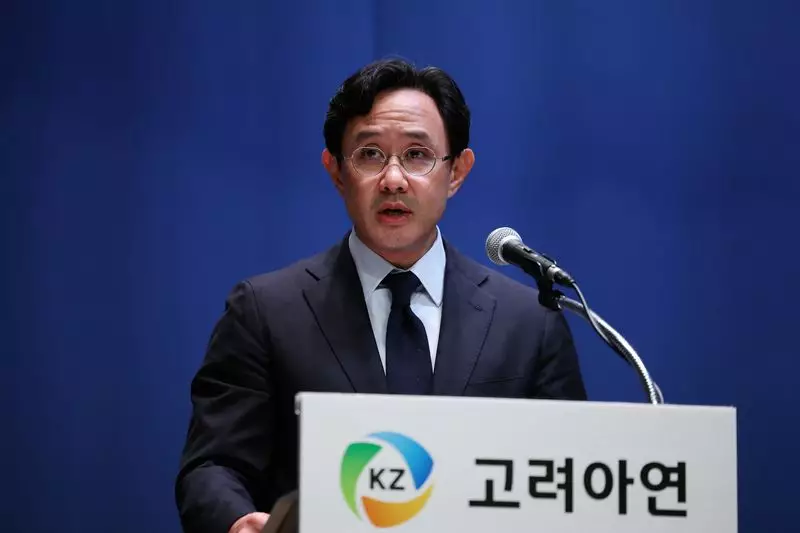In the ever-fluctuating landscape of corporate finance, Korea Zinc has recently taken a notable step back from a potentially transformative financial move. The company, renowned as the world’s largest zinc refiner, announced its decision on Wednesday to withdraw an ambitious plan to issue new shares worth approximately $1.8 billion. This strategic retreat underscores a growing tension within the company, as it grapples with a takeover battle involving significant stakeholders and faces scrutiny from regulatory bodies.
Initially, Korea Zinc’s announcement of the share issuance managed to propel its stock price upward, reflecting optimistic investor sentiment. However, this momentum was short-lived. As investor confidence wavered amidst the fallout from the announcement, the company’s shares ultimately tumbled, declining by 7% in afternoon trading. The initial increase followed by a rapid decline illustrates the volatility of market reactions to corporate announcements, particularly when they are shrouded in controversy.
The regulatory response, spearheaded by South Korea’s Financial Supervisory Service (FSS), added further complications. The FSS initiated an investigation into Korea Zinc’s proposed share issuance, focusing on potential unfair practices linked to the decision. This regulatory scrutiny not only cast a shadow over the proposed plans but also intensified the pressure on the company to clarify its intentions and justifications.
Internal Power Struggles: The Language of Control
The backdrop to Korea Zinc’s share withdrawal reveals a deeper conflict within the company’s leadership. The ongoing power struggle between Chairman Yun B. Choi and rival stakeholders—namely, Young Poong and the private equity firm MBK Partners—has become more pronounced. With Young Poong and MBK increasing their collective stake to nearly 40%, compared to Choi’s ownership of about 35%, the corporate chess game is set for a crucial showdown.
Korea Zinc’s public statement emphasized a desire to address market and shareholder concerns, reflecting an effort to maintain investor trust amidst this backdrop of contention. However, the responses from Young Poong and MBK Partners suggest that there’s significant discontent regarding how the share issuance was handled. Their joint statement lamented the confusion and damage caused to shareholders, underlining the intricate interplay between corporate governance and shareholder expectations.
As Korea Zinc pivots following the withdrawal of its share issuance plan, attention turns to its upcoming shareholder meeting, which is poised to serve as a battleground for control of the company. Both factions are preparing for a showdown—Young Poong and MBK Partners seeking to nominate 14 new board members while Choi plans to introduce independent directors to champion his vision for the firm. This pivot towards governance improvement is critical, as both sides seek to solidify their influence over company strategy and direction.
Korea Zinc’s leadership has also indicated an intention to enhance board independence and address governance issues, although specific plans remain vague. This prioritization of governance amidst struggle for control may be the company’s tactical play to attract major investors, including the National Pension Service, which holds a significant stake in its operations.
The decisions and actions taken by Korea Zinc in the coming months will be pivotal—not just for its internal dynamics but also for its reputation in the broader financial market. The withdrawal from the share issuance may represent a retreat, yet it could also pave the way for a more considered approach to governance that seeks to unify stakeholders amid impending challenges.
As the corporate narrative continues to unfold, the strategic maneuvers by both sides will be under close scrutiny. Korea Zinc stands at a crossroads; its ability to navigate these turbulent waters will ultimately determine its future trajectory and stability within the competitive zinc refining industry.

